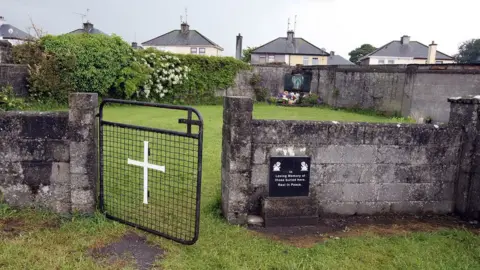Worry over plan to seal records of former Irish mother and baby homes
 AFP/Getty Images
AFP/Getty ImagesCampaigners on behalf of Irish mothers and their children born in mother and baby homes fear people will not be able to access their records because of plans to seal the archive for 30 years.
Such homes were established in the 19th and 20th centuries.
The institutions housed women and girls who became pregnant outside marriage.
Most of the babies and children were later adopted or spent time in orphanages.
It became an international news story in 2017 after "significant human remains" were discovered in the grounds of a former home in County Galway.
The home in Tuam was one of 10 Irish institutions run by religious orders, to which about 35,000 unmarried pregnant women are thought to have been sent.
A child died there nearly every two weeks between the mid-1920s and 1960s.
'Access to invaluable information'
In response, the Irish government established a Mother and Baby Homes Commission which is due to publish the findings of its 5 year investigation on 30 October.
A controversial bill relating to the records of such homes is currently working its way through parliament with academics and campaigners complaining that the proposed legislation will block access to information about "disappeared relatives or babies who are buried in unmarked graves".
The Minister for Children, Roderic O'Gorman has responded saying the bill is "needed to preserve access to invaluable information now and into the future, and not to put it beyond reach as has been reported".
Much of that information was given in private hearings.
The matter was raised in the Dáil (lower house of parliament) by Mary Lou McDonald, the leader of the main opposition party Sinn Féin.
She appealed to the taoiseach (Irish prime minister) to scrap the Bill, warning that "this will prevent people accessing their records from the Minister's archive and it will stop families accessing information about disappeared family members or babies buried in unmarked graves".
Mícheál Martin replied saying the intention of the bill was to "preserve invaluable information, not to put it beyond reach".
But campaigners, academics and adoption rights activists have made it clear they are far from convinced.
